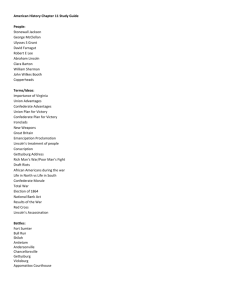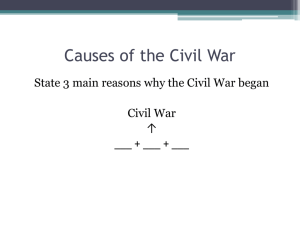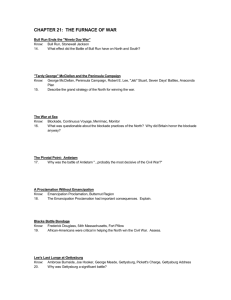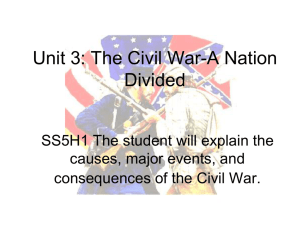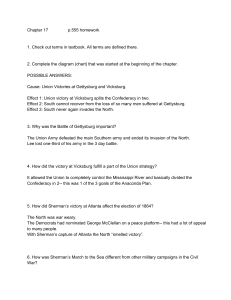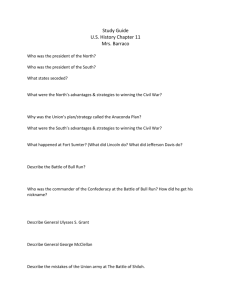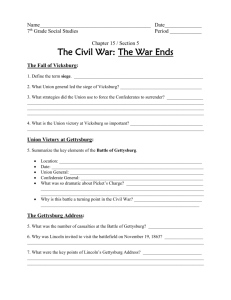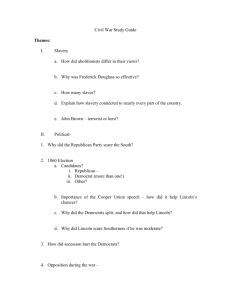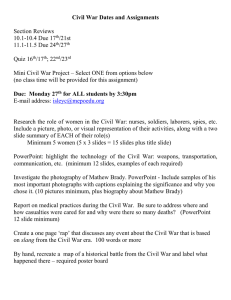Civil War 1861-1865
advertisement
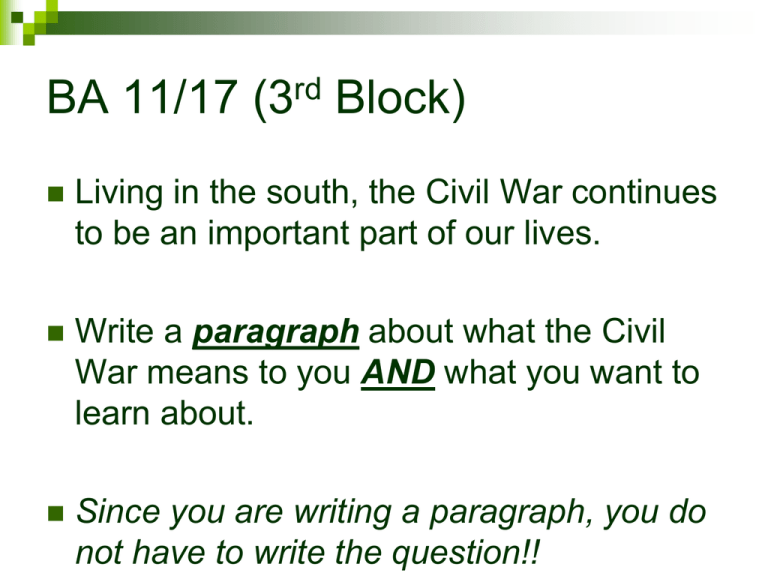
BA 11/17 (3rd Block) Living in the south, the Civil War continues to be an important part of our lives. Write a paragraph about what the Civil War means to you AND what you want to learn about. Since you are writing a paragraph, you do not have to write the question!! BA 9/18 1.Define popular sovereignty. 2. What is the importance of the Kansas-Nebraska act? 3. What’s the importance of John Brown’s Raid? 4. What was the ruling of the Dred Scott case? What was its importance? 5. Why does Lincoln’s election force the South to secede? Civil War 1861-1865 Chapter 10, Section 4 Chapter 11 SSUSH9 The student will identify key events, issues, and individuals relating to the causes, course, and consequences of the Civil War. b. Describe President Lincoln’s efforts to preserve the Union as seen in his second inaugural address and the Gettysburg speech and in his use of emergency powers, such as his decision to suspend habeas corpus. c. Describe the roles of Ulysses Grant, Robert E. Lee, “Stonewall” Jackson, William T. Sherman, and Jefferson Davis. d. Explain the importance of Fort Sumter, Antietam, Vicksburg, Gettysburg, and the Battle for Atlanta and the impact of geography on these battles. e. Describe the significance of the Emancipation Proclamation. f. Explain the importance of the growing economic disparity between the North and the South through an examination of population, functioning railroads, and industrial output. Background 1860: Abraham Lincoln wins presidential election Receives no electoral votes from South Not on ballot in most slave states Lincoln’s victory convinces South they lost their political voice in national government December 20, 1860: South Carolina secedes from US Abraham Lincoln Background continued SC secession soon followed by Mississippi, Florida, Alabama, Georgia, Louisiana and Texas 8 slaves states still in Union Seceded states meet to form the Confederate States of America Create a Constitution Protected and recognized slavery in new territories Confederate States elect Jefferson Davis as president Make Richmond, Virginia state capital Jefferson Davis Jefferson Davis Born in Kentucky Grew up in Mississippi West Point graduate US Senator from 1846-1856 Leaves Senate when Mississippi secedes Great military leader Poor confederate manager Bad relations with Confederate leaders hurts South’s chances of independence Undecided Slave States Maryland, Kentucky, Missouri, & Delaware are slave states undecided about secession Lincoln believes these states are essential to Union’s success if Civil War starts Importance of undecided states: 1. Factories used for war materials 2. Access to important rail & water routes Use to move troops & supplies Stay with US & keep slavery until end of war 7 Major Events of Civil War 1861-1863 (South winning war) 1. Fort Sumter 2. Manassas (AKA: Bull Run) 3. Antietam 1863-1865 (North winning war) 1. Gettysburg 2. Vicksburg 3. Battle for Atlanta 4. Sherman’s March to the Sea Fort Sumter Confederate states start taking over federal buildings in their states Ex: courthouses, post offices, and forts Want federal fort of Fort Sumter Fort Sumter: located on island in Charleston, SC harbor Confederacy threatens Fort Sumter Surrender or face attack Fort Sumter continued Sumter’s commander sends message to Lincoln Fort only has 6 weeks of food & little ammo Lincoln decides to send fort food but no backup Sends backup: Lincoln at fault for starting war Surrenders: Lincoln gives in to South’s demands Sends food: if South attacks, they are to blame for war Confederate President Davis declares war Fort Sumter continued Fort Sumter surrenders to South Bombed with more than 4,000 rounds Importance: news of Fort Sumter’s defeat unites North & officially starts Civil War Lincoln’s inauguration Start of Civil War North: Union South: Confederates Both sides expect a short war North’s 4 Civil War advantages: 1. Larger fighting population 2. Greater food production 3. Larger railroad system 4. Factories to produce military supplies Start of Civil War continued South’s 5 Civil War advantages: 1. Huge profits from cotton 2. Excellent generals Ex: Stonewall Jackson & Robert E. Lee 3. Strong military tradition 4. Home-field advantage 5. Highly motivated troops Group Activity here! BA 2/21 1. What attack started the Civil War? 2. What are the North’s 4 advantages? 3. What are the South’s 5 advantages? Battle of Manassas (1861) Known in north as Bull Run First major bloodshed in war 30,000 inexperienced Union troops march toward Confederate capital in Richmond, VA Meet Confederate troops & General Stonewall Jackson Stonewall Jackson Battle of Manassas continued Stonewall holds off Union until reinforcements arrive First southern victory in Civil War Importance: 1. Boosts South’s morale 2. Gives South war momentum First bull run Antietam Spring 1862: Robert E. Lee becomes commander of Confederate Army Lee decides to attack Washington D.C. While Lee was moving, Union scout explores old Confederate camp Finds copy of Lee’s army orders wrapped around cigars Union General McClellan decides to sneak attack Lee before he makes it to Washington D.C. Robert E. Lee George McClellan Antietam continued Antietam: creek in Maryland where Union (McClellan) & Confederates (Lee) meet Importance: 1. Bloodiest single day battle in American history 26,000 killed More than War of 1812 and Mexican War combined 2. Lee & Confederates retreat Confederates lose 25% of troops 3. Union General McClellan refuses to pursue If Union pursued, they could have ended the war McClellan fired next day by Lincoln Dunker Church Bloody Lane Lincoln and McClellan Gen Lee’s invasion 3 Reasons for South’s Early Civil War Victories (1861-1863) 1. Excellent military leadership by Robert E. Lee & Stonewall Jackson 2. Highly motivated 3. Have many young men willing to fight Fighting population will die out over war North will recruit new immigrants to US Lincoln’s Emancipation Proclamation Early in Civil War, Lincoln faces 2 problems: 1. South sent ambassadors to England seeking military alliance Alliance would give South war advantage 2. Lincoln dislikes slavery, but does not believe federal government can abolish it Solves both problems with Emancipation Proclamation Emancipation Proclamation Issued by President Lincoln on January 1, 1863 Ends slavery in Confederate States of America Does not apply to slave states still part of Union Maryland, Kentucky, Missouri, Delaware Allows free blacks to enter Union Army Emancipation Quote “All persons held as slaves within any State or designated part of a State the people whereof shall then be in rebellion against the United States, shall be then, thenceforward, and forever free… And upon this act, sincerely believed to be an act of justice, warranted by the Constitution upon military necessity, I invoke the considerate judgment of mankind, and the gracious favor of Almighty God.” Importance of Emancipation Proclamation 1.Gives Civil War a moral purpose for North Now North knows it is fighting to end slavery 2. Allows African Americans to fight for cause End of war make up 10% of Union Army Most were former slaves from South 3. Britain refuses to ally with South Against slavery in England Emancipation Video Habeas Corpus Not all members of Union agree with Lincoln’s actions Disloyal members in Union Lincoln deals with disloyalty forcefully Suspends Habeas Corpus Habeas Corpus: court order requiring authorities to bring a person held in jail before a court to determine why he is being jailed Habeas Corpus continued Importance: 1. 13,000 Union dissenters arrested & held without trial during war 2. Starts presidential tradition of expanding presidential powers during war Turning Tides of War 1863: Civil War momentum changes to Union 4 reasons for change: 1. Plantation system decline No one to work fields & Union blockade of southern ports 2. Loss of Confederate Generals Stonewall Jackson killed 3. Large northern industry & population Quickly make more weapons and supplies 4. Union leadership under Grant & Sherman Gettysburg (1863) 3 day battle in Gettysburg, PA Turning point of Civil War South winning most battles before Gettysburg Confederate troops under A.P. Hill lack shoes Hear about a supply in Gettysburg Hill meets with Robert E. Lee in Gettysburg Gettysburg map General Ambrose Powell Hill Gettysburg continued Union troops surround Gettysburg & set up defense in hills Lee spends 2 days in uphill battle trying to force Union to surrender Union holds hill & forces Lee to retreat Importance of Gettysburg 1. Massive casualties Union: 23,000 Confederacy: 28,000 2. Turning point in war Union starts winning major battles 3. Cripples South so badly they will never be able to attack the North again Gettysburg Address November 1863 4 months after Gettysburg Lincoln’s speech at a ceremony for cemetery built at Gettysburg battlefield Speech lasted for only 2 minutes Seen as one of America’s greatest speeches Importance: speech shows Lincoln’s desire to see US survive & reunite nation Gettysburg Address Siege of Vicksburg (1863) Union General Ulysses S. Grant splitting Confederate troops in half Working Vicksburg, Mississippi, one of remaining Confederate cities west of Mississippi Also on western side of Mississippi River an important waterway to transport goods Spring 1863: Grant attacks First 2 attacks into city failed General Ulysses S. Grant Siege of Vicksburg continued Grant bombs city for 40 days Residents forced to hide in man-made hillside caves Food supplies run low People eat dogs and mules Grant attacks city July 4th, 1863: Vicksburg surrenders to Grant City will not celebrate 4th of July for 80 years Importance of Vicksburg 1. Split Confederate forces in half No communication between east and west forces 2. End of Confederate threat west of Mississippi 3. Union can focus attack on Robert E. Lee 4. Grant appointed commander of Union Army Grant appoints William Tecumseh Sherman commander of Mississippi William Tecumseh Sherman Role of Grant & Sherman Both believe in total war Essential to fight South’s army, government, & civilian population 2 reasons for attacking civilians: 1. Civilians produce weapons, food, and transport goods to army 2. People’s will kept war going Defeating the will of the people will end the war Roles continued Grant plans to attack Lee in Virginia Sherman will raid Georgia & Confederate army protecting Atlanta Battle for Atlanta Atlanta: major Confederacy railroad line Sherman wants to control railroad & supply line After 5 months of fighting, Sherman wins Atlanta Burns down city after victory Scene used in Gone with the Wind Battle of Atlanta continued Importance: 1. Boosts Northern morale 1. Leads to Lincoln’s reelection 2. Starts Sherman’s March to the Sea Lincoln’s 2nd Inaugural Address Union victories in South and Sherman’s win in Atlanta helps Lincoln’s reelection in 1864 Lincoln issues inaugural speech while Civil War was days from ending Designed to reunite the North & South 3 Parts of Lincoln’s speech: 1. Unite North & South 2. Evils of slavery 3. Start Reconstruction Reconstruction: federal policy after Civil War designed to reunite US, end slavery, & rebuild South Sherman’s March to the Sea Ran from Atlanta to Savannah After reaching Savannah, Sherman will destroy Charleston and parts of North Carolina on way to Virginia Consisted of 100,000 Union troops Designed to take all hope & fight out of south Sherman: “make Southerners so sick of war that generations would pass away before they would again appeal to it” Sherman before burning Atlanta Ordered all citizens removed Mayor wrote letter of protest Sherman’s remarks: “The only way the people of Atlanta can hope once more to live in peace and quiet at home, is to stop the war, which can only be done by admitting that it began in error and is perpetuated in pride. We don’t want… your lands, or anything you have, but we do want and will have a just obedience to the laws of the United States Sherman’s march continued Sherman orders troops to burn crops, kill livestock, consume supplies, & destroy civilian houses & buildings along their path What was not eaten was killed or destroyed Railroad lines were bent around trees Telegraph lines are cut to stop communication December 22, 1864: Savannah surrenders to Sherman Not burned to the ground because it unconditionally surrendered Green-Meldrim Mansion Sherman’s march continued December 26: Sherman offers Lincoln Savannah as a Christmas gift Issues 40 acres and a mule speech By Savannah, 25,000 former slaves following Sherman Eliza Frances Andrews “The fields were trampled down and the road was lined with carcasses of horses, hogs, and cattle that the invaders, unable either to consume or to carry away with them, had wantonly shot down, to starve out the people and prevent them for making their crops… the dwellings that were standing all showed signs of pillage… while here and there lone chimney stacks, ‘Sherman’s sentinels,’ told of home laid in ashes” End of Civil War March 1865: Sherman & Grant marching to Richmond, VA April 2: Lee sends message to Davis that he is being overrun by Union troops Davis sets fire to Richmond so Union cannot capture it April 9: General Lee surrenders to Grant & Sherman Want to take down Confederate capital and Jefferson Davis End of fighting in Civil War Davis on run until May 1865 Captured in Irwinville, GA Lee surrenders Civil War’s Legacy 3 major changes from Civil War: 1. Political 2. Economic 3. Social Legacy continued 1. Political Increases Federal government’s power Becomes supreme authority of US Federal government passes military draft 2. Economic Creation of national railroad system Ruined South’s economy No slaves, destroyed farms Widened money gap between North & South 1870: less than 40% of South earned average pay in North 3. Social Legacy Creation of 13th Amendment 13th Amendment: abolish slavery in all US states Nurse Clara Barton creates American Red Cross Provides help for human suffering (earthquakes, hurricanes, national disasters) Lincoln assassinated by John Wilkes Booth Assassinated in Ford Theater 5 days after Lee’s surrender Policy of Reconstruction in South John Wilkes Booth Lincoln is assassinated
